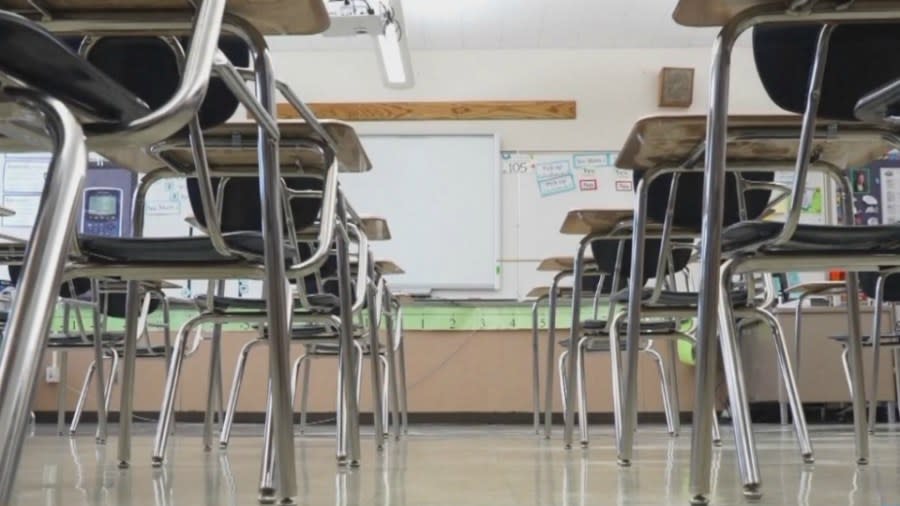‘So many problems’: Vancouver teachers’ union challenges special education plan

PORTLAND, Ore. (KOIN) – The Vancouver Education Association filed a grievance against Vancouver Public Schools on Monday over the district’s plans for special education students to join general education classes.
The plan would place middle school and high school special education students in self-contained settings into general education science, health, and social studies classes at the start of the second semester on Jan. 30.
The district laid out the plan in the “Weekly Special Services Bulletin” newsletter to teachers explaining those courses are not areas of Specially Designed Instruction, therefore special education teachers should not teach those classes.
Mayor Wheeler pushes Central City employees to return to in-office work
The Bulletin states “Students must earn unique credits in both science and social studies that are graduation requirements such as Washington State History and Biology. Special Education teachers are generalists, endorsed to teach areas of SDI on a student’s [Individualized Education Program.]”
The district added that school teams should work with their assistant director to transition students who are joining general education classes for the second semester.
However, the teacher’s union argues the move violates its collective bargaining agreement, school board policies and the federal Individuals with Disabilities Education Act.
Newberg restaurant secures Oregon’s only entry on OpenTable’s top 100 list
“There are so many problems with this, it’s hard to know where to start,” VEA President Jamie Anderson said of the district’s plans. “These students are going to be joining entirely new classes halfway through the year, which is a challenge for any student. General education and special education teachers are scrambling to figure out how to ensure that these students still get the individualized education they are entitled to under federal law and aren’t being set up for failure.”
“It’s the students who will suffer the most,” Anderson added. “We’re optimistic that the School Board will do the right thing, but we are also exploring remedies available under state and federal law in case we need to go there.”
The union argues that the plan sets a “unilateral determination” for student placement, noting Individualized Education Program teams determine which classrooms students are placed in and that it’s not the district’s choice.
This Pacific Northwest state is the best for job hunters in the US: Study
The union claims their concerns about the plan were dismissed by the district in an email exchange between Nov. 9 and Nov. 13.
Among their concerns, VEA is worried about the workload impact the plan would have on both general education and special education teachers and whether or not student needs are met.
In an email sent Nov. 13 to VPS Director of Special Services Jami Phelps, VEA Executive Director Graham Picklesimer explained, “Since there are no new legal requirements regarding pushing students into gen ed settings to receive instruction in science/social studies content areas, it would seem that there is no need to proceed with any plans to do so.”
Cape Meares Loop Road on Oregon Coast reopens after 10-year closure
In her response, also sent Nov. 13, Phelps said the district is continuing with their plan, noting if students are not able to access the courses in general education, IEP teams can work with the principal on “how to appropriately support that student.”
On Tuesday, VEA President Jamie Anderson sent an email to district school board directors with the union’s concerns. Anderson explained the issue was first brought to the union’s attention when teachers at Columbia River High School were asked to place students into the general education setting and “unilaterally amend” the IEP structure without plans to support students.
Anderson furthered “When VEA questioned this at labor management in October, VPS Special Services Executive Director Daniel Bettis told us that legally, self-contained educators cannot provide the credits necessary to meet graduation requirements for content-specific areas, like social studies and sciences, as they are ‘generalists’ and can only provide instruction in SDI areas (e.g. math, reading, behavior support, adaptive skills). This is untrue. In fact, when teaching students exclusively in the special education setting, special educators are considered ‘in-endorsement area’ when providing services to their students.”
Jazz bar closure leaves employees out thousands of dollars
She added, “They are only considered ‘out-of-field’ when also providing instruction in these content areas to students only receiving general education services. When we shared this information with VPS leadership, Special Education Director Jami Phelps, said they planned on moving forward regardless.”
Vancouver Public Schools tells KOIN 6 News they are working with the teacher’s union through the grievance process.
“We agree and acknowledge that students’ services are determined by their Individualized Education Program (IEP) team. We also acknowledge that the way our original staff newsletter was written was confusing about our direction and intent. The newsletter was meant only as a proactive reminder of our guidelines that all students should be included in the general education setting to the maximum extent possible, not a blanket change to the district’s instructional model. This reminder was provided as we are approaching the end of the first semester (end of January) – a natural time to revisit individual student schedules,” VPS said.
Mayor Wheeler pushes Central City employees to return to in-office work
In a statement, Washington’s Office of Superintendent of Public Instruction said “The research is clear that students with disabilities experience the strongest long-term outcomes when they have access to grade-level content in general education settings. We commend our school and district partners as they work to implement inclusionary practices and increase students’ access to core instruction in general education settings. As with all special education considerations, instructional and placement decisions should always be student-centered and individualized and made in collaboration with the student’s IEP team, including the student, their family, and their educators.”
Vancouver Public Schools has until Dec. 4 to respond to the grievance.
For the latest news, weather, sports, and streaming video, head to KOIN.com.

